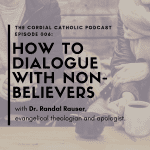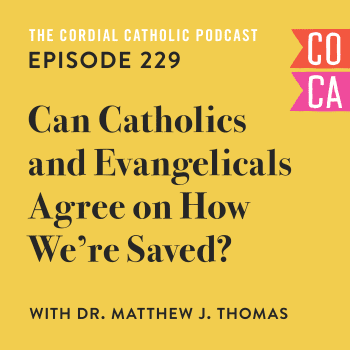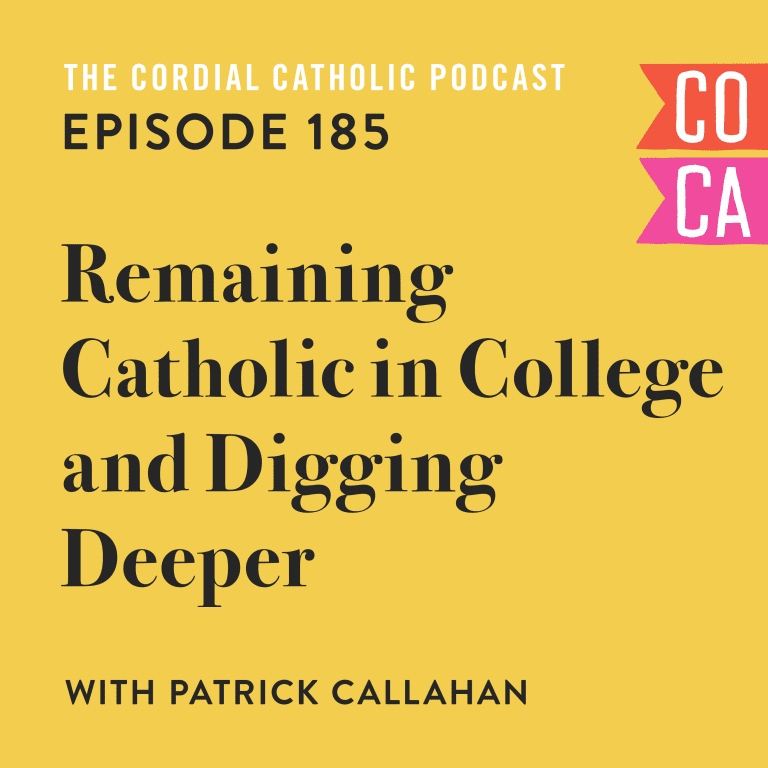
I was recently blessed to have a conversation with Dr. Randal Rauser on my podcast.
Dr. Rauser, an evangelical theologian, philosopher, and apologist, is someone who I’ve admired from afar for his ability to effortlessly unpack and examine how we do evangelization. It was a pleasure to have a chance to talk to him and the insights he provided in our hour-long interview—no surprise here—were absolutely invaluable.
If you haven’t listened to the podcast please be sure to check it out. But, of our purposes here, I want to summarize some of the great information Dr. Rauser shared.
Here are five tips to more meaningfully engage with non-believers.
Make Relationships Matter
Dr. Rauser is unequivocal that relationships matter. In fact, says Dr. Rauser, we are made for relationships. That’s simply how God designed us; and this is how we need to interact and engage with non-believers.
We need to, first, build meaningful relationships with people for the sake of relationships before we even begin to share the Gospel message with them. These relationships, importantly, can’t be formed with the goal of “winning souls” or trying to persuade people of our point-of-view; we should be making and keeping friends, engaging with our coworkers and neighbours, because we’re Christians, and that’s what God designed us for.
Putting a priority on relationships means we’re caring more about people, about their needs and wants and goals and aspirations, full stop. While their immortal soul and their spiritual health is of the utmost importance it can’t be the focus of why we’re engaging in relationships with other people.
We are meant to love other people as an end in itself, not just a means to evangelize.
Listen First
As we engage with those in our social circles Dr. Rauser also emphasizes that we need to be listeners first.
Elbowing our way into a conversation, talking over others to get our opinions out there, and trying to evangelize and proselytize without first listening can not only damage a relationship but it can turn somebody off from the Christian message indefinitely. Before jumping in with both feet to share our passionate love for Christ with others we need to listen to their needs first.
It’s an incredibly simple concept, but one we so often forget: it isn’t all about us.
By truly and deeply listening we not only work to build up meaningful relationships, built on mutual appreciation and respect, but we learn about one another—we listen and learn better how we can help someone; how we can pray for that person, serve that person, and, ultimately, share Christ to meet their needs.
After all, it’s not one-size-fits-all.
Don’t “Check the Oven” Too Often
In the course of our conversation, Dr. Rauser shared the powerful analogy of a baker checking on their cake in the oven.
If you open the oven too often the cake will never bake; something will go wrong, it won’t turn out. Anyone who eats that cake will find it disgusting and might be turned off cake for a long time.
The same applies to our evangelization.
I can think, shamefully, of several friends I “evangelized” in high school who were effectively turned off of Christianity because I served up a disappointingly half-baked version.
As a zealous new convert I talked non-stop to my rough-around-the-edges punk rock friends about how great Jesus was and how my life was changed. I didn’t know enough, back then, to slow down and approach the subject more prayerfully. Instead, I served up a Jesus that wasn’t fully formed; and could never realistically meet the needs of my friends.
I was young, and stupid, but the point is still the same. In our rush to share our faith we sometimes come across too strong or too soon. We need to “check the oven” a little less. Let things bake; let the Holy Spirit work in the lives of the people we interact with and take opportunities to share the reason for the hope that we have when possible—but don’t keep “checking” to see how it’s working out.
Know Your Audience
Dr. Rauser emphasizes the importance of knowing your audience. This, he says, is why building that relationship up front is so important.
We approach evangelization differently for every single person we encounter; every single person we have a relationship with.
I can speak about Jesus differently with someone I’ve known for 20 years than I would with a person I bump into in the grocery aisle. Our relationships are very differently.
Likewise, I can approach evangelization differently when speaking with a former Catholic (oh, there are plenty!) than I would in speaking to a former charismatic or a Mormon or someone who was raised as an atheist. I can use terminology and examples with a person who has experienced something of the Catholic faith that I would never dream of trying to explain to someone who has no religious belief at all.
It just wouldn’t make sense.
With a prioritization on relationships, we need to approach how we share our faith accordingly, based on how well we know a person and what we know about them.
Be Humble
Finally, Dr. Rauser notes the importance of intellectual humility when engaging with others around issues of faith and belief.
Simply aiming to win an argument will do just that: win an argument. But that’s not the point.
Instead, we want to engage in relationships (for their own sake) and be measured about how we approach faith topics—approach them with the genuine attitude that we don’t know everything.
“If you think there aren’t good arguments against your position,” says Dr. Rauser, “You probably don’t know your position very well.”
There are good arguments for both belief and non-belief; being intellectually humble, realizing that we don’t know everything, makes us much more effective apologists than storming into a conversation ready to prove everyone else wrong.
Be willing to be wrong. Be willing to say, “I don’t know, but I’ll find out,” when something stumps you.
Ultimately, being honest is a more effective evangelization than letting ego get in the way and coming across as if you know everything.
Bonus Tip: Remember, It’s Not About You Anyway
One more bonus tip, just from me.
Remember that it’s God who is working this out at any rate.
As stupid as it sounds, we often forget about God when evangelizing for Him. We forget that it’s the Holy Spirit working through us; that ultimately we can do nothing to move a person’s heart closer to a relationship with Christ.
We can plant the seeds, we can till the soil, we can put, as Dr. Rauser says, a “pebble in the shoe” but it’s God who has to work in that person to move them closer to Him. It’s Him, the Creator and Sustainer of the Universe, that we’re entering into a parntership with when we evangelize. It’s that that we have to remember, and not try to rely solely on our own wit and ability.
In these cases—in all of our evangelism—prayer is probably our most powerful tool.
To hear more from Dr. Rauser, check out The Cordial Catholic podcast. Or, listen below.












